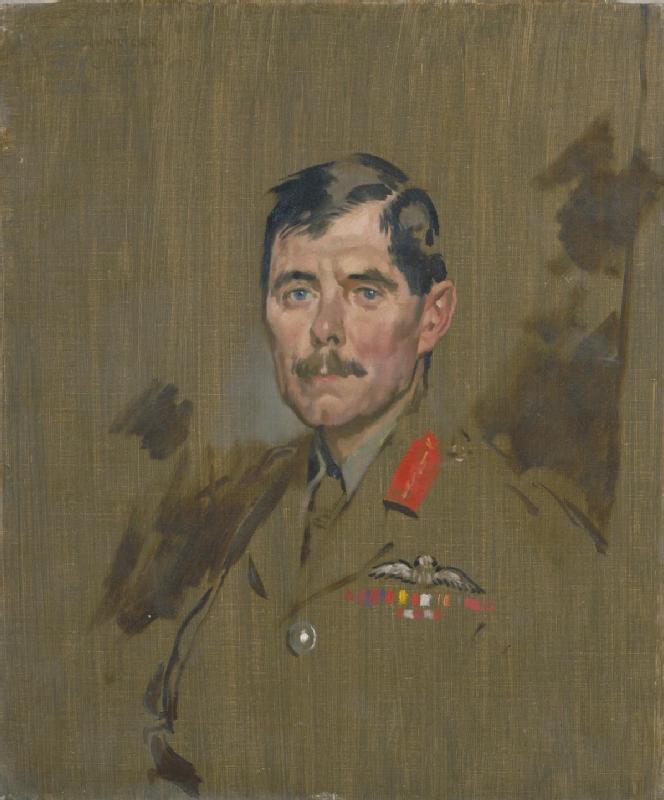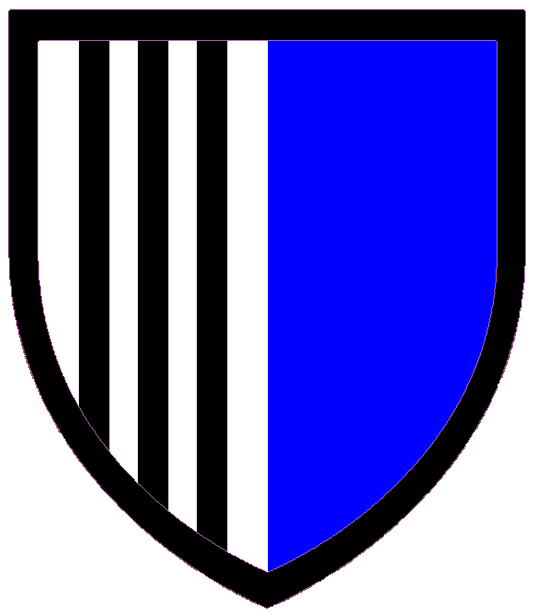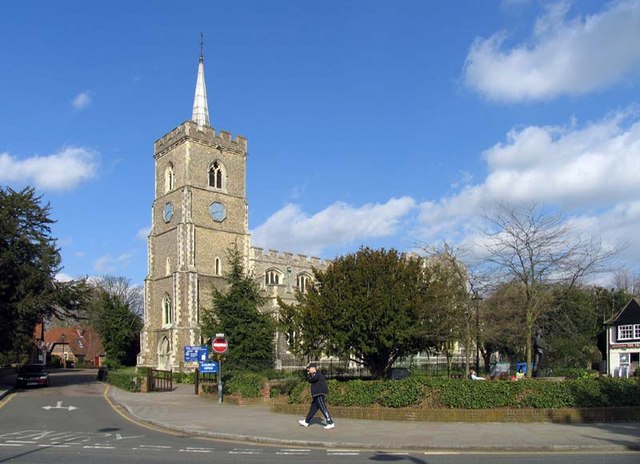|
Viscount Trenchard
Viscount Trenchard, of Wolfeton in the County of Dorset, is a title in the Peerage of the United Kingdom. It was created in 1936 for Marshal of the Royal Air Force, Hugh Trenchard, 1st Baron Trenchard. He had already been created a Baronet, of Wolfeton in the County of Dorset, in the Baronetage of the United Kingdom in 1919 and Baron Trenchard, of Wolfeton in the County of Dorset, in 1930, also in the Peerage of the United Kingdom. His second son, the second Viscount, held junior ministerial positions from 1979 to 1983 in the Conservative administration of Margaret Thatcher. the titles are held by the latter's son, the third Viscount, who succeeded in 1987. In 2004 he replaced the recently deceased Lord Vivian as one of the ninety elected (by hereditary peers) hereditary peers that are allowed to remain in the House of Lords after the passing of the House of Lords Act 1999. Lord Trenchard sits on the Conservative benches. The family seat is Standon Lordship, near Ware, Hertfo ... [...More Info...] [...Related Items...] OR: [Wikipedia] [Google] [Baidu] |
Sir Hugh Trenchard (cropped)
Marshal of the Royal Air Force Hugh Montague Trenchard, 1st Viscount Trenchard, (3 February 1873 – 10 February 1956) was a British officer who was instrumental in establishing the Royal Air Force. He has been described as the "Father of the Royal Air Force." During his formative years, Trenchard struggled academically, failing many examinations and only just succeeding in meeting the minimum standard for commissioned service in the British Army. As a young infantry officer, Trenchard served in India and with the outbreak of the Boer War, he volunteered for service in South Africa. While fighting the Boers, Trenchard was critically wounded and as a result of his injury, he lost a lung, was partially paralysed and returned to Great Britain. On medical advice, Trenchard travelled to Switzerland to recuperate and boredom saw him taking up bobsleighing. After a heavy crash, Trenchard found that his paralysis was gone and that he could walk unaided. Following further recuperation, ... [...More Info...] [...Related Items...] OR: [Wikipedia] [Google] [Baidu] |
Hertfordshire
Hertfordshire ( or ; often abbreviated Herts) is one of the home counties in southern England. It borders Bedfordshire and Cambridgeshire to the north, Essex to the east, Greater London to the south, and Buckinghamshire to the west. For government statistical purposes, it forms part of the East of England region. Hertfordshire covers . It derives its name – via the name of the county town of Hertford – from a Hart (deer), hart (stag) and a Ford (crossing), ford, as represented on the county's coat of arms and on the Flag of Hertfordshire, flag. Hertfordshire County Council is based in Hertford, once the main market town and the current county town. The largest settlement is Watford. Since 1903 Letchworth has served as the prototype Garden city movement, garden city; Stevenage became the first town to expand under post-war Britain's New Towns Act 1946, New Towns Act of 1946. In 2013 Hertfordshire had a population of about 1,140,700, with Hemel Hempstead, Stevenage, Watford ... [...More Info...] [...Related Items...] OR: [Wikipedia] [Google] [Baidu] |
Trenchard Escutcheon
Marshal of the Royal Air Force Hugh Montague Trenchard, 1st Viscount Trenchard, (3 February 1873 – 10 February 1956) was a British officer who was instrumental in establishing the Royal Air Force. He has been described as the "Father of the Royal Air Force." During his formative years, Trenchard struggled academically, failing many examinations and only just succeeding in meeting the minimum standard for commissioned service in the British Army. As a young infantry officer, Trenchard served in India and with the outbreak of the Boer War, he volunteered for service in South Africa. While fighting the Boers, Trenchard was critically wounded and as a result of his injury, he lost a lung, was partially paralysed and returned to Great Britain. On medical advice, Trenchard travelled to Switzerland to recuperate and boredom saw him taking up bobsleighing. After a heavy crash, Trenchard found that his paralysis was gone and that he could walk unaided. Following further recuperation, ... [...More Info...] [...Related Items...] OR: [Wikipedia] [Google] [Baidu] |
Coronet Of A British Viscount
A coronet is a small crown consisting of ornaments fixed on a metal ring. A coronet differs from other kinds of crowns in that a coronet never has arches, and from a tiara in that a coronet completely encircles the head, while a tiara does not. In other languages, this distinction is not made as usually the same word for ''crown'' is used irrespective of rank (german: Krone, nl, Kroon, sv, Krona, french: Couronne, etc.) Today, its main use is not as a headgear (indeed, many people entitled to a coronet never have a physical one created), but as a rank symbol in heraldry, adorning a coat of arms. Etymology The word stems from the Old French ''coronete'', a diminutive of ''co(u)ronne'' ('crown'), itself from the Latin ''corona'' (also 'wreath') and from the Ancient Greek ''κορώνη'' (''korōnē''; 'garland' or 'wreath'). Traditionally, such headgear is used by nobles and by princes and princesses in their coats of arms, rather than by monarchs, for whom the word ... [...More Info...] [...Related Items...] OR: [Wikipedia] [Google] [Baidu] |
St Hugh's College, Oxford
St Hugh's College is one of the constituent colleges of the University of Oxford. It is located on a site on St Margaret's Road, to the north of the city centre. It was founded in 1886 by Elizabeth Wordsworth as a women's college, and accepted its first male students in its centenary year in 1986. It enjoys a reputation as one of the most attractive colleges because of its extensive gardens.Wintle, Justin (2008) ''Perfect Hostage''. Random House, p. 177. In its 125th anniversary year, the college became a registered charity under the name "The Principal and Fellows of St Hugh's College in the University of Oxford". As of July 2018, the college's financial endowment was £37.6 million. History Founding and early years St Hugh's was founded in 1886 by Elizabeth Wordsworth (great-niece of the poet William Wordsworth) as a women's college, to help the growing number of women "who find the charges of the present Halls at Oxford and Cambridge (even the most moderate) beyond ... [...More Info...] [...Related Items...] OR: [Wikipedia] [Google] [Baidu] |
Eton College
Eton College () is a Public school (United Kingdom), public school in Eton, Berkshire, England. It was founded in 1440 by Henry VI of England, Henry VI under the name ''Kynge's College of Our Ladye of Eton besyde Windesore'',Nevill, p. 3 ff. intended as a sister institution to King's College, Cambridge, making it the 18th-oldest Headmasters' and Headmistresses' Conference (HMC) school. Eton is particularly well-known for its history, wealth, and notable alumni, called :People educated at Eton College, Old Etonians. Eton is one of only three Public school (United Kingdom)#21st century, public schools, along with Harrow School, Harrow (1572) and Radley College, Radley (1847), to have retained the boys-only, boarding-only tradition, which means that its boys live at the school seven days a week. The remainder (such as Rugby School, Rugby in 1976, Charterhouse School, Charterhouse in 1971, Westminster School, Westminster in 1973, and Shrewsbury School, Shrewsbury in 2015) have sinc ... [...More Info...] [...Related Items...] OR: [Wikipedia] [Google] [Baidu] |
Elizabeth II
Elizabeth II (Elizabeth Alexandra Mary; 21 April 1926 – 8 September 2022) was Queen of the United Kingdom and other Commonwealth realms from 6 February 1952 until her death in 2022. She was queen regnant of 32 sovereign states during her lifetime, and was head of state of 15 realms at the time of her death. Her reign of 70 years and 214 days was the longest of any British monarch and the longest verified reign of any female monarch in history. Elizabeth was born in Mayfair, London, as the first child of the Duke and Duchess of York (later King George VI and Queen Elizabeth The Queen Mother). Her father acceded to the throne in 1936 upon the abdication of his brother Edward VIII, making the ten-year-old Princess Elizabeth the heir presumptive. She was educated privately at home and began to undertake public duties during the Second World War, serving in the Auxiliary Territorial Service. In November 1947, she married Philip Mountbatten, a former pr ... [...More Info...] [...Related Items...] OR: [Wikipedia] [Google] [Baidu] |
Page Of Honour
A Page of Honour is a ceremonial position in the Royal Household of the Sovereign of the United Kingdom. It requires attendance on state occasions, but does not now involve the daily duties which were once attached to the office of page. The only physical activity involved is usually carrying the long train of the Queen's robes. While a page is a comparatively low-ranking servant, a Page of Honour is a distinguished position. It is usually a distinction granted to teenage sons of members of the nobility and gentry, and especially of senior members of the Royal Household. Pages of Honour participate in major ceremonies involving the British monarch, including coronations and the State Opening of Parliament. Livery Pages of Honour in England wear a scarlet frock coat with gold trimmings, a white satin waistcoat, white breeches and hose, white gloves, black buckled shoes and a lace cravat and ruffles. A sword is also worn with the outfit and a feathered three-cornered hat is pr ... [...More Info...] [...Related Items...] OR: [Wikipedia] [Google] [Baidu] |
Heir Apparent
An heir apparent, often shortened to heir, is a person who is first in an order of succession and cannot be displaced from inheriting by the birth of another person; a person who is first in the order of succession but can be displaced by the birth of a more eligible heir is known as heir presumptive. Today these terms most commonly describe heirs to hereditary titles (e.g. titles of nobility) or offices, especially when only inheritable by a single person. Most monarchies refer to the heir apparent of their thrones with the descriptive term of ''crown prince'' or ''crown princess'', but they may also be accorded with a more specific substantive title: such as Prince of Orange in the Netherlands, Duke of Brabant in Belgium, Prince of Asturias in Spain (also granted to heirs presumptive), or the Prince of Wales in the United Kingdom; former titles include Dauphin in the Kingdom of France, and Tsesarevich in Imperial Russia. The term is also used metaphorically to indicat ... [...More Info...] [...Related Items...] OR: [Wikipedia] [Google] [Baidu] |
Hugh Trenchard, 3rd Viscount Trenchard
Hugh Trenchard, 3rd Viscount Trenchard, (born 12 March 1951), is a British soldier and businessman. In 1987, he succeeded to his father's titles. He is one of the ninety hereditary peers in the House of Lords, elected to sit after the passing of the House of Lords Act 1999, sitting as a Conservative. The son of the 2nd Viscount Trenchard and Patricia Bailey, he was educated at Eton College in Berkshire and at Trinity College, Cambridge, where he graduated with a Bachelor of Arts in 1973. Trenchard served in the 4th Battalion, The Royal Green Jackets from 1972 to 1980, reaching the rank of Captain. In 2006, he became Honorary Air Commodore of 600 (City of London) Squadron, Royal Auxiliary Air Force. He is a Deputy Lieutenant of Hertfordshire since 2006, and a Lieutenant of the City of London since 2016. He was appointed Senior Adviser to Her Majesty's Government on Japanese Financial Services in 2018. Trenchard worked for Kleinwort Benson from 1973 to 1996, as chief represe ... [...More Info...] [...Related Items...] OR: [Wikipedia] [Google] [Baidu] |
Thomas Trenchard, 2nd Viscount Trenchard
Thomas Trenchard, 2nd Viscount Trenchard MC (15 December 1923 – 29 April 1987) was a hereditary peer and junior minister in Margaret Thatcher's Conservative government from 1979 to 1983. Thomas Trenchard was born in 1923, the son of Katherine and Hugh Trenchard, whom many regard as the father of the Royal Air Force. He was educated at Eton College and served in the King's Royal Rifle Corps in World War II being awarded the MC in 1945. On 19 June 1948, Thomas Trenchard married Patricia Bailey, the daughter of Admiral Sir Sidney Robert Bailey. They had three children: * Hon Hugh Trenchard (b. 12 March 1951), later 3rd Viscount Trenchard; * Hon John Trenchard (b. 13 March 1953) who married Clare Marsh (youngest daughter of Edward Chandos de Burgh Marsh, of The Old Rectory, Salcott, Essex) in 1983, and has issue (one son and one daughter); and * Hon Thomas Henry Trenchard (16 July 1966 – 23 February 2003) who married Sarah Saunders in 1997, and had one daughter. He succeed ... [...More Info...] [...Related Items...] OR: [Wikipedia] [Google] [Baidu] |
Ware, Hertfordshire
Ware is a town in Hertfordshire, England close to the county town of Hertford. It is also a civil parish in East Hertfordshire district. Location The town lies on the north–south A10 road which is partly shared with the east–west A414 (for Hertford to the west and Harlow to the east). There is a large viaduct over the River Lea at Kings Meads. The £3.6m two-mile bypass opened on 17 January 1979. At the north end of the bypass is the Wodson Park Sports and Leisure Centre and Hanbury Manor, a hotel and country club. The former route of the A10 through the town is now the A1170. The railway station is on the Hertford East Branch Line and operated by Greater Anglia and is on a short single track section of the otherwise double track line. History Archaeology has shown that Ware has been occupied since at least the Mesolithic period (which ended about 4000 BC). The Romans had a sizeable settlement here and foundations of several buildings, including a temple, and two cemeter ... [...More Info...] [...Related Items...] OR: [Wikipedia] [Google] [Baidu] |







